Will Squirrels Eat Herb Plants? Best Ways to Stop it Fast
Squirrels are an adorable and curious part of our ecosystem. Many people enjoy watching them gather food or scamper up trees. But what happens when they start to explore your herb garden? Will Squirrels Eat Herb Plants?
We may think that squirrels do not eat herb plants, but there are exceptions. Squirrels are like rabbits, they like a wide variety of plants and as long as they can find a plant that they like and the root is ready for eating, they will eat it.
Squirrels don’t always find an easy source of food, but they can eat almost any kind of plant that is green. They will eat marjoram, parsley, cilantro, arugula, basil, dill, bay leaf, fennel, and watercress. They dislike thyme, rosemary, oregano, mint, and peppermint.
Squirrels are primarily omnivorous, meaning they eat both meat and vegetation. But in their natural environment, there is only vegetation.
So in order to get protein, they’ll eat plants. And when plants are healthy and have plenty of nutrients and moisture, they are also attractive to them. But that’s all that they do – they just hang around.
Squirrels can’t tell the difference between healthy plants and the unhealthy ones. They just go for the ones they can get hold of and eat.
And if you don’t get rid of the seeds before they ripen and start attracting pests, they can end up eating the entire plant, which can be a real problem.
Table of Contents
- 1 Will Squirrels Eat Herb Plants? Best Ways to Stop it!
- 2 Frequently Asked Questions
- 2.1 What herbs will squirrels not eat?
- 2.2 Do squirrels like herb plants?
- 2.3 Do squirrels eat mint plants?
- 2.4 How do I protect my herb garden from squirrels?
- 2.5 Do squirrels hate mint plants?
- 2.6 Do coffee grounds keep squirrels away from plants?
- 2.7 How do you keep squirrels out of basil plants?
- 2.8 What scares squirrels away?
- 2.9 What kind of plant do squirrels hate?
- 2.10 What spice do squirrels hate?
- 2.11 Do squirrels like rosemary plants?
- 2.12 What smells do squirrels avoid?
- 2.13 What herbs do chipmunks not like?
- 2.14 Do herb gardens attract rodents?
- 2.15 What should you not plant near herbs?
- 2.16 How do you protect herbs from rodents?
- 3 Author
Will Squirrels Eat Herb Plants? Best Ways to Stop it!
Mow your Lawn
Keeping your lawn mowed is one of the most important steps you can do to keep squirrels away from your herb plants. Mowing regularly will create an environment that isn’t favorable for them, and it will also prevent them from feeding on any seeds they may find.
Not only is regular mowing essential to discourage them from visiting your yard, but it also helps keep the ground free from debris and other items that can attract their attention.
Regularly mowing your grass ensures that there won’t be many places for them to hide or chew, which will make it more difficult for them to get near your herb plants.
Remove Food Sources
Removing food sources is the key when trying to deter squirrels from your herb plants. Squirrels are easily attracted to any fallen nuts, seeds, and fruit, so taking the time to rake up what has fallen off of trees in your yard is essential.
Additionally, be sure to remove all food sources from bird feeders, as this can also draw them in. Doing these two things will help limit their access to any edible snacks that may encourage them to venture over to your garden and feast on your herbs.
Install Motion or Timer Activated Sprinklers
Motion activated sprinklers are an effective and low-cost way to deter squirrels from your herb garden. These devices detect movement and spray water in the targeted area, which is usually enough to scare the squirrel away. They are easy to install and can be programmed for specific sensitivities and operating times.
Plus, since they are motion based, they won’t waste water or disrupt any of the other wildlife in your yard. You can also adjust their range so that they only target specific areas where you want to keep animals out, such as near your herb garden.
Motion or timer activated sprinklers are an excellent way to protect your herb plants without harming the environment or other wildlife. Rain Bird Sprinkler Systems available on Amazon offer an affordable and efficient option for your garden.
Timer-based sprinklers can be set up in specific areas, allowing you to water those precious herbs while keeping a close eye on their growth and development. Not only is this system cost-effective, but it’s also environmentally friendly, as it uses significantly less water than traditional methods of irrigating gardens.
Installing motion or timer activated sprinklers can give you peace of mind knowing that your herbs are safe from animals, and are receiving proper care without unnecessarily wasting resources.
Install Fencing or Netting
Installing a wire fence or netting is one of the most effective solutions for keeping squirrels away from your herb garden. Chicken wire is often the best choice, as its small holes make it difficult for them to access the plants.
Alternatively, netting can be laid out over the top of the plant and will also keep them away. Both are relatively low-cost and easy to install, so they’re an ideal option for those looking to protect their herbs without breaking the bank!
When looking for an effective solution, I found some great options on netting and wire fencing on Amazon. With just a few simple steps, you can protect your herbs from hungry squirrels!
Keep your Garden Clean
Squirrels like to gather herbs and berries and if you happen to have a garden with lots of bushes and trees you can be sure that squirrels will be visiting them. If you keep your garden clean and tidy and take care of it properly, then you will be less likely to attract squirrels in.
Squirrels will also take herbs from plants that are close to the ground. This includes parsley, arugula, cilantro, basil, dill, bay leaf, fennel, and watercress. If you keep these herbs near your garden or on top of your garden fences, then you will be less likely to be visited by squirrels.
It is a good idea to have a natural pest repellant on hand if you want to keep squirrels away. Some of these will also work against cats, as they will deter them from coming near your herb garden and destroying your plants and shrubs.
Many people believe that keeping a garden with bushes on top can attract squirrels away from your garden. However, it is important to make sure that the bushes are not too tall for the squirrels to easily reach.
Try Natural Prevention
What is the secret to keeping squirrels away from your garden with Cayenne pepper? Do you know, but it just won’t happen? Do you know it, but your squirrels just won’t leave it alone? Then read on.
If you live in an area where there is a high degree of the population of squirrels, then chances are good that you have heard of using Cayenne pepper to scare them off. It is not uncommon to hear of homeowners using this method to get rid of squirrels. It is also very common to see commercial brands advertised for their use.
Using Cayenne pepper to keep squirrels away from your garden is a good idea. The smell of pepper mixed with water will discourage squirrels, and they will also avoid the plants and fruits that contain the Cayenne pepper.
Using Cayenne pepper to keep squirrels away from your garden, can also prevent them from eating your plants, which can lead to diseases. If a squirrel eats a plant that is infected by bacteria or fungi, it can cause severe sickness in humans.
You can find Cayenne pepper sprays for sale at many stores and even online, and you can get more information on how to use it. So get ready, and enjoy your garden, without having to worry about the squirrels.
Use the Cayenne pepper trick to keep squirrels away from your garden and keep them away from your garden, trees, fences, and other areas that you do not want them to go to.
Remove Garbage
Clean up and remove any garbage around your home or garden to deter squirrels. As scavengers, they look for food sources in the most unlikely places – from trash cans to bird feeders and even your herb plants.
Make sure to cover any exposed compost or waste bins securely, as well as clearing away fallen fruits or nuts that may have been left behind. All of these can attract hungry squirrels, who will happily munch on your herbs if given the chance.
By being proactive with keeping your yard clean and free of possible food items, you can help prevent any unwanted visitors from ruining your garden.
Use Blood Meal
One neat trick to eliminate squirrels is to use blood meal. Using blood meal is a great way to keep squirrels away from your herb garden. Blood meal is a powdery fertilizer made from dried animal blood and has an extremely unpleasant scent that repels unwanted pests.
Sprinkling it around the base of the plants will deter them from coming close, without causing any harm. The scent can also linger in the ground for up to six months, so one application should be enough to keep your herbs safe.
Additionally, adding some nitrogen-rich fertilizer will give your herbs the boost they need to thrive in spite of the unwelcome visitors! If you’re wondering where you can buy it, I found the lowest price for Blood Meal on Amazon.
Try Squirrel Repellents
Squirrels are notorious for raiding gardens and eating up plants. If you have a herb garden, it is important to be aware of the threat squirrels pose. One way to protect your herbs from squirrels is by using repellents.
Scents like white pepper, black pepper, and garlic will naturally turn them away from your garden. You can spray these scents on the plants or even sprinkle some peppermint oil around the area.
This should create an unpleasant barrier that will keep the pesky critters at bay, allowing your herbs to thrive without fear of being eaten!
Call A Pest Control
If none of these methods work for you, then the best option is to call a pest control company. They can come and spray your yard at least once a year, and sometimes twice if your yard is a little larger.
Once they spray, you’ll have to wait a week or two before you can go out and pick up any food that’s left behind. Keep in mind that many lawn care companies charge a reasonable fee to spray your yard.
Conclusion
These small pests can cause a lot of damage to our residential yards. For one, they eat garden plants, dig up roots, and often kill growth. By following the steps above, you have a good chance of eliminating them from your herb garden once and for all.
Frequently Asked Questions
What herbs will squirrels not eat?
Squirrels are curious creatures, but not all animals share the same dining preferences. When it comes to herb plants, there are certain types that squirrels simply won’t eat. These include thyme, rosemary, oregano, mint, peppermint, cayenne, black pepper, safflower and witch hazel.
While some of these herbs may have a strong aroma or taste that deters them from consumption, others like mint provide little nutritional value for the animal.
Do squirrels like herb plants?
Squirrels are known to eat a variety of different herbs, including marjoram, parsley, cilantro, arugula, basil, dill, bay leaf, fennel and watercress. Squirrels have a natural affinity for these types of plants because they are full of essential nutrients that can help sustain them.
Plus, herbs provide protection from predators and other environmental elements. Furthermore, squirrels enjoy the taste and texture these plants offer – providing them a tasty snack or meal while they’re out in the wild! All in all, it’s safe to say that squirrels love munching on their favorite herb plants.
Do squirrels eat mint plants?
Squirrels are known to eat many different forms of vegetation, but they usually won’t touch mint plants. While some species may nibble on the leaves or stems of a mint plant, they tend to avoid them altogether. This is because the strong aroma and taste of mint can be quite off-putting for squirrels.
Additionally, some types of mint can have mild toxic effects on these animals if eaten in large amounts. So if you want squirrels to stay away, it’s always best to plant anything related to the mint family near your home.
How do I protect my herb garden from squirrels?
Protecting your herb garden from squirrels is important to ensure your plants have the best chance at growing properly. The most effective way of doing this is to install fencing or netting around the garden perimeter.
This will keep the squirrels from being able to easily access the herbs and potentially damage them. Not only will it prevent the squirrels from entering, but it can also be used to help preserve moisture and improve air circulation in the soil, which leads to healthier plants.
Additionally, if you want further protection for individual plants, you can place a tall cylinder of chicken wire around each herb plant as an extra deterrent.
Do squirrels hate mint plants?
Yes, squirrels do hate mint plants. Any plant in the mentha family is toxic to them and can cause digestive problems, irritation and even death if consumed. Squirrels have a strong sense of smell, so they will detect the scent of mint and stay away from it.
Even when there are other food sources available nearby, they won’t eat anything near, or touching, a mint plant. Some gardeners will use dried peppermint tea bags, scattered around their gardens, as a natural repellent to keep squirrels away.
Do coffee grounds keep squirrels away from plants?
Coffee grounds can be used to effectively keep squirrels away from plants. Their strong, earthy aroma is not pleasant for squirrels and serves as a deterrent for them. Coffee grounds also have an acidic quality that deters squirrels from digging up the soil around your plants.
If you spread freshly ground coffee grounds around or near your plants, it will create an unpleasant smell in their territory, and they’ll be less likely to approach.
You can also make a mixture of equal parts coffee grounds and cayenne pepper, which has an even stronger scent that will keep them away. It’s a simple solution with no harsh chemicals involved!
How do you keep squirrels out of basil plants?
Netting or fencing is an effective way to keep squirrels out of basil plants. A small fence surrounding the plant can discourage squirrels from digging in the soil, while also keeping other animals away.
If using netting, it should be placed over the entire area and securely attached at least 6 inches off the ground so that squirrels cannot jump up and over it.
Alternatively, chicken wire can be used; however, this may require additional support as it is relatively flimsy compared with netting.
Finally, a mixture of cayenne pepper and water can be applied to the soil around your plant, as well as onto the leaves – although this will need to be reapplied after rain or watering.
What scares squirrels away?
Squirrels are naturally timid animals, so there are several things that can scare them away. Loud noises like shouting and clapping can startle squirrels and make them run away.
Installing motion-activated lights or sprinklers in your yard is an effective way to frighten the animals, too. They don’t like shiny objects, so aluminum foil or pie tins hung near their entry points will also deter them.
Placing substances such as cayenne pepper or mothballs around areas they frequent may discourage them from coming back. To prevent squirrels from climbing trees, you can wrap baffles around the trunk at least five feet off the ground.
What kind of plant do squirrels hate?
Squirrels are notorious for their appetite, but there are some plants they hate. All forms of mint plants and alliums, such as garlic or onions, produce a strong odor that squirrels may be put off by. Additionally, daffodils can help deter animals like squirrels because of their unpleasant taste and aromatic scent.
They contain a poisonous compound which makes them indigestible to the small mammals. Other plants that repel squirrels include rhododendrons, azaleas, and euonymus due to their spiny leaves.
Therefore, if you’re looking for something to discourage squirrels from digging up your garden beds or destroying your bulbs, one of these might do the trick!
What spice do squirrels hate?
Squirrels are naturally drawn to nuts, seeds, and fruits. Unfortunately for these critters, certain spices can be a real deterrent. Some of the most commonly used spices in this regard are cinnamon, cayenne pepper, and white pepper.
Cinnamon has an intense smell that many animals dislike, so sprinkling it around a garden or other areas where squirrels may be present can help to keep them away. Cayenne pepper has an even more potent smell and taste to it which will not only make squirrels stay away but also repel some insects.
White pepper is another excellent tool when trying to ward off squirrels, as its strong aroma and taste makes food items that contain it unappealing to them. While all three spices have their own advantages, they should be used together with caution, since some animals may still find them too spicy or offensive.
Do squirrels like rosemary plants?
Squirrels are known to be curious creatures with a wide variety of tastes. One question that often arises is whether or not they like rosemary plants. The answer is yes, squirrels do in fact enjoy the smell, flavor, and texture of rosemary plants.
Squirrels have been observed nibbling on the leaves of rosemary plants, as well as digging around their roots in order to access the nutrients within them. Rosemary also provides squirrels with a boost of energy due to its high levels of essential oils and other compounds.
Additionally, some research has indicated that rosemary can help fight against parasites which may be present in a squirrel’s diet. All in all, it seems that these furry animals do appreciate Rosemary plants!
What smells do squirrels avoid?
Squirrels are incredibly sensitive to odors and smells, and will often avoid anything that carries an unpleasant scent. Some of the most common smells squirrels try to stay away from include strong perfumes or colognes, garlic, vinegar, tobacco smoke, mothballs, ammonia-based cleaning products, gasoline, bleach, and hot pepper spray.
Squirrels can detect these smells from far distances and generally prefer to keep their distance. Additionally, certain plants such as onions, garlic, mint, peppermint, rue, lemon balm, cinnamon and cayenne pepper can chase away squirrels if planted near a garden.
While it is true that squirrels do not like these scents and tend to stay away from them when possible, sometimes other factors such as food availability may override their natural aversion.
What herbs do chipmunks not like?
Chipmunks are small rodents that are active during the day and can sometimes be seen rummaging through gardens in search of food. Despite their cute and cuddly appearance, chipmunks can wreak havoc on a garden if they aren’t kept away.
One way to keep them at bay is by planting certain herbs that they do not like. Some herbs that are known to repel chipmunks include mint, garlic, lavender, rosemary and thyme. These aromas create an unpleasant odor for chipmunks, which will help deter them from entering your garden space.
Planting these herbs around the perimeter of the garden or anywhere where chipmunks might travel will act as a natural repellent and offer protection for your plants.
Do herb gardens attract rodents?
Herb gardens can be a source of food for rodents, such as mice and rats. Rodents are attracted to the scents of herbs like rosemary, basil, and oregano, and to their nutrient-rich leaves. If a herb garden is left untended, it provides an ideal habitat for rodents to hide and feed.
Additionally, if compost or mulch is used around a herb garden, these materials can provide additional shelter for rodents. Proper maintenance of a herb garden is key in preventing rodent infestations. This includes regular watering, weeding, and trimming away overgrown plants.
Also, using raised beds instead of ground planting will make it more difficult for rodents to access the plants. Finally, installing fences or barriers can help keep rodents away from your herb garden.
What should you not plant near herbs?
When planting herbs, it’s important to think about what other plants you put near them. Herbs have specific needs in order to grow and thrive, and the wrong neighbors can hinder their development. For example, some vegetables release chemicals that compete with nearby herbs for nutrients in the soil, resulting in stunted growth.
Plants with a high nutrient demand like tomatoes or peppers will also compete for nutrients needed by your herbs, so it’s best to avoid close-proximity when planting them.
Additionally, some plants, like garlic and onions, can spread disease and pests that are harmful to herbs. When choosing what plants to place near your herbs, make sure they won’t be competing for resources or introducing diseases.
How do you protect herbs from rodents?
Rodents can be a huge nuisance in the garden, especially when it comes to fragile herbs. Thankfully, there are several methods for protecting your herb garden from these pesky animals. The first step is to remove any existing food sources that may attract rodents to the area.
This includes garbage and compost piles, as well as pet food and bird feeders. You should also create physical barriers like mesh fencing that rodents cannot climb over or chew through to keep them away from your plants.
Furthermore, natural repellents like garlic, peppermint oil, and predator urine all work to deter rodents from coming near your garden. Finally, trapping and relocating the pests is an effective way of removing them from your growing space altogether. With these steps, you can protect and enjoy your fragrant herbs without worry!
Related Post: What Herb Plants Keep Mosquitoes Away The Best












